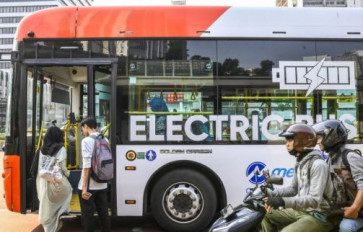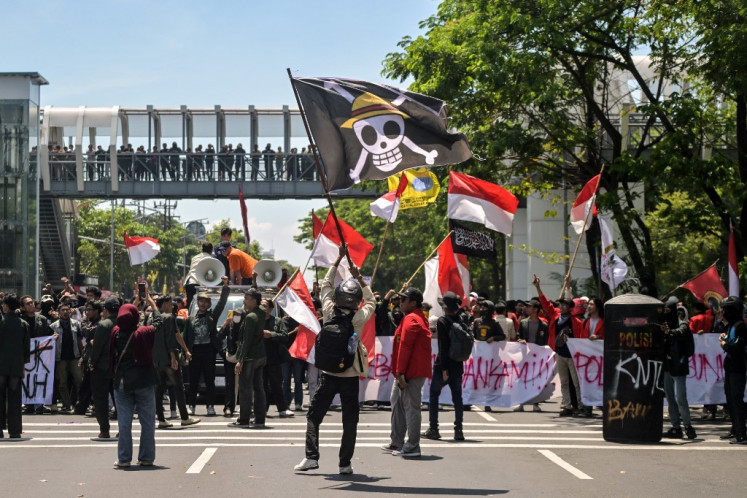Popular Reads
Top Results
Can't find what you're looking for?
View all search resultsPopular Reads
Top Results
Can't find what you're looking for?
View all search resultsRI says no to private armed guards aboard vessels
While calling for global efforts to combat piracy and vessel hijacking, Indonesia opposes the proposed recruitment of private armed security guards (PCASP) on ships aimed to ensure security and safety on international waters
Change text size
Gift Premium Articles
to Anyone
W
hile calling for global efforts to combat piracy and vessel hijacking, Indonesia opposes the proposed recruitment of private armed security guards (PCASP) on ships aimed to ensure security and safety on international waters.
Transportation Minister E.E. Mangindaan said the hiring of private armed security guards on ships had been a pretty hot issue at the recent meeting of the International Maritime Organization’s (IMO) maritime safety committee in London; it had also been the subject of prolonged debate among stakeholders at home.
“But the government will consistently oppose the proposal due to the absence of national and international legal instruments,” Mangindaan said during the opening of the International Transport Workers’ Federation’s Asia-Pacific regional conference in Jakarta on Tuesday.
“In addition, we must also comply with the Maritime Safety Convention 1 circulars 1333 and 1334, which stipulate that state flags should try to prevent the use of firearms among sailors. Moreover, the use of private armed security guards could raise security problems and crimes on board ships,” he added.
Indonesia fell victim to a recent hijacking of one of its cargo vessels in Somali waters off Africa. The MV Sinar Kudus, which at the time of the attack was en route to Europe with its cargo of crude palm oil and manned by a 16-strong Indonesian crew, was hijacked last year by armed Somali pirates who demanded a ransom of US$3.5 million. The ship and its crew were released 10 months later following the deployment of Indonesian elite soldiers.
Mangindaan said the government preferred to boost bilateral, regional and international cooperation in the fight against armed robbery, hijacking and piracy. He cited as an example the multilateral cooperation between Indonesia, Malaysia and Singapore in patrolling the busy Malacca Strait and South China Sea.
The government announced recently that it would continue to support the Marine Electronic Highway project to help improve maritime security and safety on the Malacca Strait and that it had established a national data center as an important step toward improving safety and environmental protection at sea.
Mangindaan added that the government planned to ratify the 2006 Labor Maritime Convention and the 2007 International Labor Organization (ILO) Convention on fishing to improve protection for Indonesian seafarers, despite strong resistance from certain stakeholders. “Indonesia is still waiting for the ILO convention’s international enforcement while preparing for its ratification.”
The planned ratification of the two conventions have sparked protests from fishermen and ship owners who traditionally apply a kinship principle and sharing system, while the conventions stipulate seafarers’ essential basic rights and the payment of salaries on a regular basis.
Chairman of the Indonesian Seafarers’ Association (KPI), Hanafi Rustandi, criticized the government for the weak law enforcement that had victimized most seafarers.
“The government should crack down on the rapid increase of manning agents, including the National Agency for Overseas Labor Placement and Protection [BNP2TKI], which recruit many seafarers and place them on fishing and cargo vessels without adequate training. This situation has led many ship owners to underpay them,” he said.
Manning agencies demand seafarers pay around Rp 40 million ($4,240) to work on foreign cruise ships, after which time most are paid only $535 monthly; while those employed on fishing ships are often underpaid because of a lack of competence.
The KPI revealed that many ships have suffered accidents, resulting in the deaths of passengers and seafarers, not only due to inclement weather but also — and more often — due to loose supervision among port authorities.










